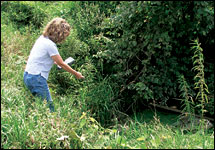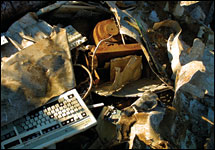MLUI / Articles from 1995 to 2012 / Groundswells
Groundswells
The Great Lakes’ Greatest Problems…and Solutions MLUI
The Great Lakes Radio Consortium, whose reports may air on a public radio station near you, produced a special, 10-episode series in October listing the top 10 threats to the Great Lakes Basin. The threats include the usual suspects—invasive species, urban and farmland water runoff, unwise shoreline development, unsafe beaches, factory pollution, and unregulated water withdrawals. But they also include lesser-known problems like canal dredging, disappearing native species, and hidden pollution hot spots. To hear the entire series, visit the group’s Web site, http://www.glrc.org/topten.php3. Then read Water Works, our own Andy Guy’s in-depth report on the great economic opportunities sustainable Great Lakes water development offers Michigan. Visit www.mlui.org, click on the Water Works icon, and read, order, or download the handsome, hopeful 24-page publication. 
Portland’s Smart Housing Prices
 | |
| MLUI | |
| A homebuilders’ study debunks a longstanding myth about Smart Growth and the high cost of urban housing. |
To read some Institute articles on affordable housing, check page nine of this issue. Then visit www.mlui.org and type those two magic words into our search engine.
Congestion vs. Consensus
 | |
| MLUI | |
| In Grand Traverse County, old opponents are seeking new ways for the region to grow. |
Windfall Profits?
 | |
| MLUI | |
| Wind turbines: A better bargain. |
Sadly, wind power progress in Michigan is slow, as Carolyn Kelly recently reported on our Web site, www.mlui.org. Type her name into the search box to find Carolyn’s article.
Meanwhile, the Public Interest Research Group in Michigan says that the state’s coal-fired power plants now annually emit 2,464 lbs. of mercury, making many fish caught in the state’s waters unsafe for children and pregnant women to eat. This continues despite a recent Abacus Associates poll finding that Michiganians, by a 7-to-1 margin, think electric companies should use available technologies to cut those emissions.
The Granholm administration says it wants to completely eliminate mercury emissions in the state. That would help wind power, because the cost of the mercury-reduction technology would raise the cost of coal power slightly, making wind power even more competitive. If, in the meantime, the Legislature passed several pending bills that would better facilitate wind turbine developments, we just might see more wind power here—a good thing in a state that is the nation’s 14th-heaviest mercury emitter, 14th-windiest state, and darn near dead last in wind turbine construction. Another PIRGIM report, released last February, maintains that fully developing Michigan’s clean energy potential would generate 3,300 new jobs annually through 2020 and, in that year alone, would save Michiganians $567 million on their electricity bills.
What Brown Can Do to You
 | |
| MLUI/Stephanie Rudolph | |
| Sierra Club volunteers tested water quality downstream from 66 Michigan CAFOs. |
Transit: cheaper to keep ‘er?
 | |
| MLUI/Carol Blundy | |
| Soaring gasoline prices are driving a rise in transit use. |
Meanwhile, Livonia voters approved a proposal to withdraw from metro Detroit’s regional bus system, even as leaders elsewhere continue to pull ahead of Michigan with their support of public transit. Los Angeles’ new mayor exercised a rarely used right to chair his city’s Metropolitan Transportation Authority, and then promised to push harder for good transit in his severely sprawled region by extending the city’s three new rapid-commute lines. And the Illinois Legislature came through for the Chicago Transit Authority, boosting its support enough to help it avoid massive service cuts at least through year’s end.
Who, Me? Yes, You!
 | |
| MLUI |
Greenbelt Grows, Council Holds Nose
The Ann Arbor area continues to develop the state’s first sprawl-slowing “greenbelt.” In August, Webster Township became the seventh township to get with the local program. Voters passed a property tax that funds the purchase of development rights for farmland that will then become part of the no-growth district, which city residents overwhelmingly approved two years ago. Two neighboring townships have also approved similar millages; four of the other five area townships have passed resolutions supporting the program.
But it still ain’t easy bein’ a greenbelt builder. Recently Ann Arbor City Council members held their noses and voted 10 to 1 to lift the city’s ban on livestock factories. The surprising move was necessary so that the city could qualify for a $182,000 federal matching grant for the town’s first actual greenbelt development rights purchase. Council members said they oppose livestock factories; several promised to find other ways to keep them far, far away.
Court Says ‘No’ to a Mt. Trashmore
 | |
| MLUI | |
| Gibraltar citizens mobilized to protect the Detroit River. |
The Friends of the Detroit River played a leading role in stopping the riverside mountain o’trash; they and others then worked to elect some new city council members who think the whole thing stinks. There’s more about the Friends at http://www.detroitriver.org.





